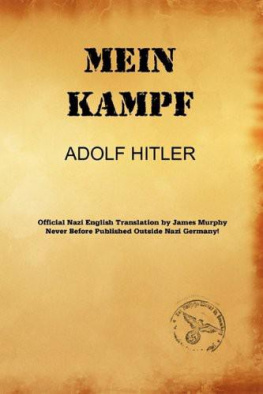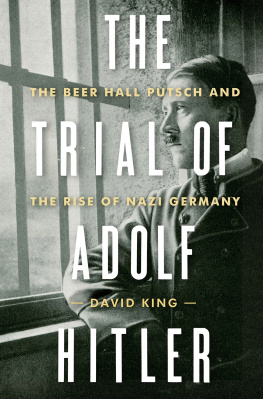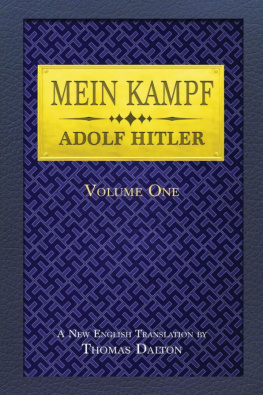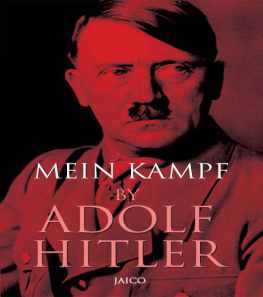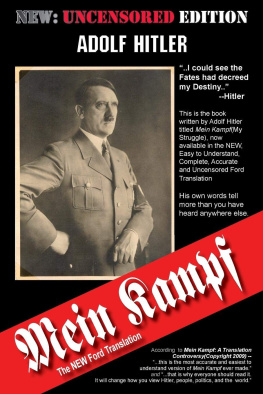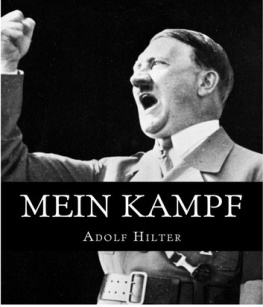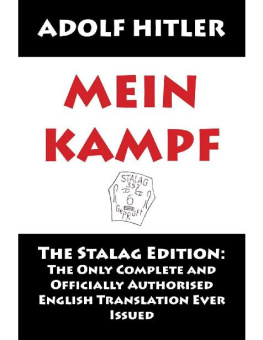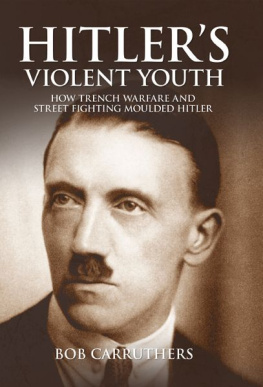HitlerAdolf - Mein Kampf
Here you can read online HitlerAdolf - Mein Kampf full text of the book (entire story) in english for free. Download pdf and epub, get meaning, cover and reviews about this ebook. City: Camarillo;Calif;Germany, year: 1942;2010, publisher: Houghton Mifflin;Elite Minds Inc, genre: Art. Description of the work, (preface) as well as reviews are available. Best literature library LitArk.com created for fans of good reading and offers a wide selection of genres:
Romance novel
Science fiction
Adventure
Detective
Science
History
Home and family
Prose
Art
Politics
Computer
Non-fiction
Religion
Business
Children
Humor
Choose a favorite category and find really read worthwhile books. Enjoy immersion in the world of imagination, feel the emotions of the characters or learn something new for yourself, make an fascinating discovery.
- Book:Mein Kampf
- Author:
- Publisher:Houghton Mifflin;Elite Minds Inc
- Genre:
- Year:1942;2010
- City:Camarillo;Calif;Germany
- Rating:5 / 5
- Favourites:Add to favourites
- Your mark:
Mein Kampf: summary, description and annotation
We offer to read an annotation, description, summary or preface (depends on what the author of the book "Mein Kampf" wrote himself). If you haven't found the necessary information about the book — write in the comments, we will try to find it.
In 1922, just four years after the war to end all wars, an unknown Austrian then living in Bavaria planned a pamphlet to be called Settling Accounts. In it he intended to attack the ineffectiveness of the dominant political parties in Germany which were opposed to the new National Socialists (Nazis). In November 1923, Adolf Hitler was jailed for the abortive Munich Beer Hall putsch along with men willing and able to assist him with his writing. With the help of these collaborators, chief among them Rudolf Hess, the pamphlet became a book. Settling Accounts became Mein Kampf, an unparalleled example of muddled economics and history, appalling bigotry, and an intense self-glorification of Adolf Hitler as the true founder and builder of the National Socialist movement. It was written in hate and it contained a blueprint for violent bloodshed. When Mein Kampf was published in 1925, it was a failure. In 1926 a second volume appeared - it was no more successful than the first. People either laughed at it or ignored it. They were wrong to do so. As Hitlers power increased, pressure was put on all party members to buy the book. Gradually this pressure was extended to all elements of the German population. Soon Mein Kampf was even being passed out to newlywed couples as a gift. Ironically, and frighteningly, by the time Hitler came to power on January 30, 1933, what has been considered by many to be the most satanic book ever written was running neck and neck with the Bible at the top of the German bestseller lists. In his excellent introduction to this definitive American translation of Mein Kampf, Konrad Heiden writes: For years Mein Kampf stood as proof of the blindness and complacency of the world. For in its pages Hitler announced -- long before he came to power -- a program of blood and terror in a self-revelation of such overwhelming frankness that few among its readers had the courage to believe it ... That such a man could go so far toward realizing his ambitions, and -- above all -- could find millions of willing tools and helpers; that is a phenomenon the world will ponder for centuries to come. We would be wrong in thinking that such a program, such a man, and such appalling consequences could not reappear in our world of the present. We cannot permit our selves the luxury of forgetting the tragedy of World War II or the man who, more than any other, fostered it. Mein Kampf must be read and constantly remembered as a specimen of evil demagoguery that people whenever men grow tired of thinking and acting for themselves. Mein Kampf is a blueprint for the age of chaos. It transcends in historical importance any other book of the present generation. In his translation Ralph Manheim has taken particular care to give an exact English equivalent of Hitlers highly individual, and often awkward style, including his occasional grammatical errors. We believe this book should stand as the complete, final, and definitive English version of Hitlers own story of his life, his political philosophy, and his thwarted plans for world domination. Translated by Ralph Manheim with an introduction by Konrad Heiden. A compilation of Hitlers most famous prison writings of 1923--the bible of National Socialism and the blueprint for the Third Reich.
HitlerAdolf: author's other books
Who wrote Mein Kampf? Find out the surname, the name of the author of the book and a list of all author's works by series.

